In today’s rapidly evolving digital landscape, eCommerce process management is a critical aspect of running a successful online business. It involves overseeing and optimizing the various steps involved in selling products or services online, from order placement to delivery. As the complexity of eCommerce operations grows, the need for efficient and streamlined processes becomes increasingly important.
Automation has emerged as a powerful tool for simplifying complex eCommerce workflows. By automating repetitive tasks, businesses can reduce manual errors, improve productivity, and enhance overall customer satisfaction. This blog post will delve into key processes that can be automated to improve efficiency and scalability in eCommerce. We’ll explore how automation can streamline operations, reduce costs, and drive business growth.
Article Outline
Understanding eCommerce Process Management
eCommerce process management refers to the systematic approach of overseeing and optimizing the various stages involved in running an online store. From managing inventory and processing orders to handling customer inquiries and shipping products, effective process management is crucial for the success of any eCommerce business.
By streamlining operations and eliminating bottlenecks, effective process management can lead to improved customer experiences, reduced operational costs, and increased productivity. When customers have a seamless shopping experience, they are more likely to return and recommend the business to others. Additionally, by automating repetitive tasks, businesses can free up resources to focus on higher-value activities, such as product development and marketing.
Automation has become an indispensable tool in modern eCommerce. By leveraging automation technologies, businesses can enhance process efficiency, reduce errors, and improve overall performance. In the following sections, we will explore how automation can be applied to specific eCommerce processes, starting with order processing.
What is eCommerce Process Management?
eCommerce process management encompasses a wide range of activities, including:
- Order processing: Receiving and processing customer orders, verifying payments, and preparing shipments.
- Inventory management: Tracking stock levels, managing product information, and replenishing inventory.
- Customer service: Responding to customer inquiries, resolving issues, and providing support.
- Marketing and sales: Promoting products, generating leads, and closing sales.
By effectively managing these processes, businesses can ensure a smooth and efficient customer journey, from browsing products to receiving their purchases.
As operations grow more complex, many brands hire an eCommerce Manager to own this end-to-end journey and keep each team and system aligned. This role helps standardize workflows, monitor performance, and resolve issues before they affect customers, especially as order volume increases or new channels are added.
Why Automation is Critical in eCommerce Process Management
Automation offers numerous benefits for eCommerce businesses, including:
Increased efficiency: Automating repetitive tasks, such as order processing and inventory management, can significantly reduce manual labor and improve overall efficiency.
Reduced errors: Automation helps minimize human error, ensuring accurate order fulfillment and reducing costly mistakes.
Improved customer satisfaction: Faster order processing and timely shipping can enhance customer satisfaction and loyalty.
Cost savings: By automating tasks, businesses can reduce labor costs and improve operational efficiency.
Scalability: Automation enables businesses to handle increased demand without compromising quality or efficiency.
In the next section, we will delve deeper into how automation can be applied to order processing, one of the most critical areas of eCommerce process management.
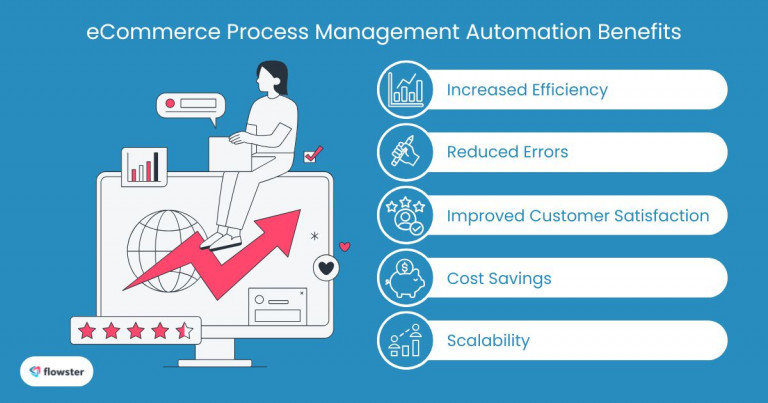
Order Processing Automation
Order processing is a critical stage in the eCommerce process, involving tasks such as receiving orders, verifying payments, preparing shipments, and updating inventory. Automating order processing can significantly improve efficiency, reduce errors, and enhance customer satisfaction.
By automating order processing, businesses can streamline the entire workflow, from customer purchase to delivery. This automation typically involves integrating various systems, such as an online store, payment gateway, shipping carrier, and inventory management software. When an order is placed, the system automatically verifies payment, updates inventory levels, generates shipping labels, and notifies the customer about the order status.
Key Benefits of Automating Order Processing
Automating order processing offers several key benefits:
- Faster processing time: Automated systems can process orders much faster than manual methods, reducing wait times for customers and improving their overall experience.
- Fewer errors in inventory management: By integrating with inventory management systems, automated order processing can help prevent stockouts and overstock situations, ensuring accurate inventory levels.
- Improved customer communication and tracking: Automated systems can send automatic order confirmations, shipping notifications, and tracking information to customers, keeping them informed throughout the process.
In the next section, we will explore how inventory management can also be automated to further improve efficiency and accuracy in eCommerce operations.
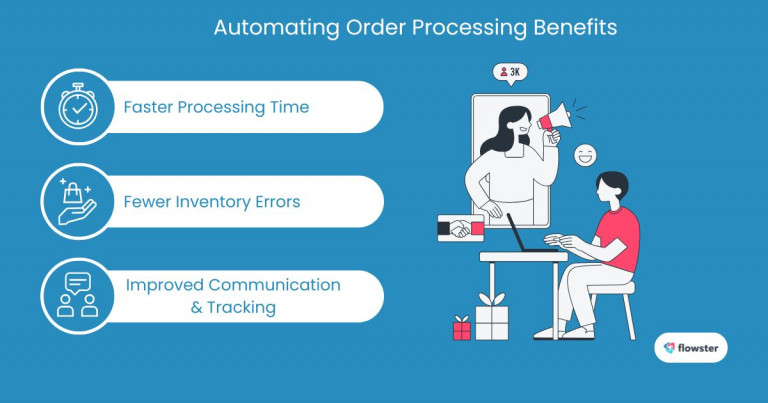
Inventory Management Automation
Inventory management is another critical aspect of eCommerce process management. Manually managing inventory can be time-consuming, error-prone, and lead to inefficiencies. By automating inventory management, businesses can gain better visibility into stock levels, prevent stockouts, and ensure timely reordering.
Automation technologies can track inventory in real-time, providing businesses with accurate and up-to-date information. When stock levels fall below a certain threshold, automated systems can trigger restocking alerts, ensuring that products are replenished before they run out. Additionally, inventory management automation can be integrated with sales channels to provide real-time visibility into product availability and sales performance.
Benefits of Automating Inventory Management
Automating inventory management offers several key benefits:
- Real-time inventory tracking: Automated systems can provide accurate and up-to-date information on stock levels, helping businesses avoid stockouts and overstocking.
- Efficient restocking alerts: Automated restocking alerts can help ensure that products are replenished in a timely manner, minimizing disruptions to sales.
- Integration with sales channels: By integrating with sales channels, inventory management automation can provide real-time visibility into product availability and sales performance, enabling businesses to make data-driven decisions.
In the next section, we will explore how customer support automation can further enhance the eCommerce experience and improve customer satisfaction.
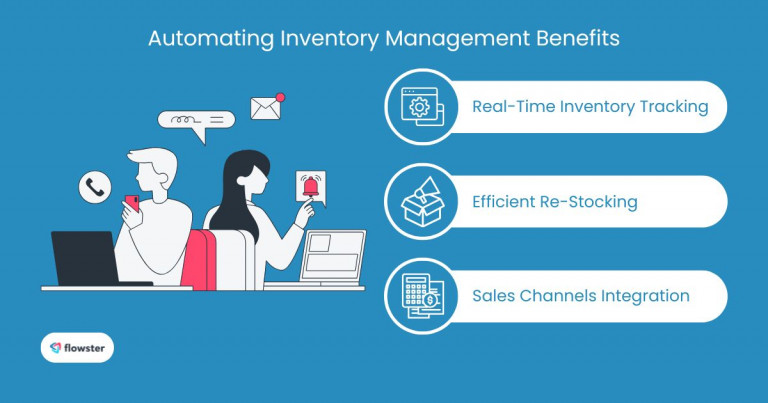
Customer Support Automation
Effective customer support is essential for building strong relationships with customers and driving repeat business. Automation can play a significant role in enhancing customer support efficiency and improving overall satisfaction.
Tools like chatbots and AI-powered systems can be used to automate many customer support tasks, such as answering frequently asked questions and providing basic assistance. These automated systems can provide 24/7 support, ensuring that customers always have access to help when they need it. Additionally, by handling routine inquiries, automation can free up human agents to focus on more complex issues, leading to faster resolution times and improved customer satisfaction.
How Automation Improves Customer Support Efficiency
Customer support automation offers several key benefits:
- 24/7 support availability: Automated systems can provide continuous support, ensuring that customers always have access to help, regardless of the time of day.
- Quick resolution of frequently asked questions: Chatbots and AI-powered systems can quickly answer common customer inquiries, reducing wait times and improving customer satisfaction.
- Reduced workload for human agents: By automating routine tasks, automation can free up human agents to focus on more complex issues, improving their efficiency and productivity.
In the next section, we will explore how marketing and sales automation can be used to streamline these processes and drive business growth.
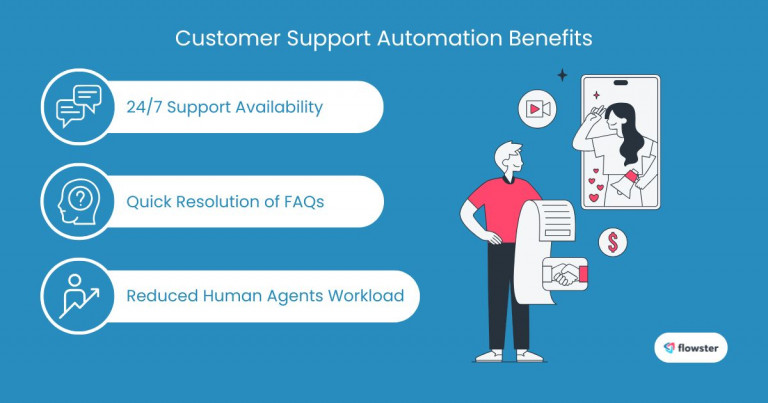
Marketing and Sales Automation
In today’s competitive eCommerce landscape, effective marketing and sales strategies are essential for driving growth and customer acquisition. Automation can streamline these processes, helping businesses deliver personalized experiences and increase efficiency.
By automating marketing campaigns, such as email marketing, SMS campaigns, and retargeting ads, businesses can maintain consistent engagement with their customers while saving time and resources. Automated systems can trigger personalized messages based on customer behavior and preferences, delivering relevant content at the right time.
The Advantages of Marketing Automation in eCommerce
Marketing and sales automation offers several key advantages:
- Personalized customer journeys: Automated systems can create personalized customer journeys, tailoring messages and offers based on individual preferences and behavior.
- Timely follow-ups with abandoned cart reminders: Automated abandoned cart reminders can help recover lost sales by encouraging customers to complete their purchases.
- Efficient management of promotional campaigns: Marketing automation tools can streamline the creation, scheduling, and delivery of promotional campaigns, saving time and effort.
In the next section, we will explore a case study that demonstrates how automation can be used to improve eCommerce process management and drive business success.
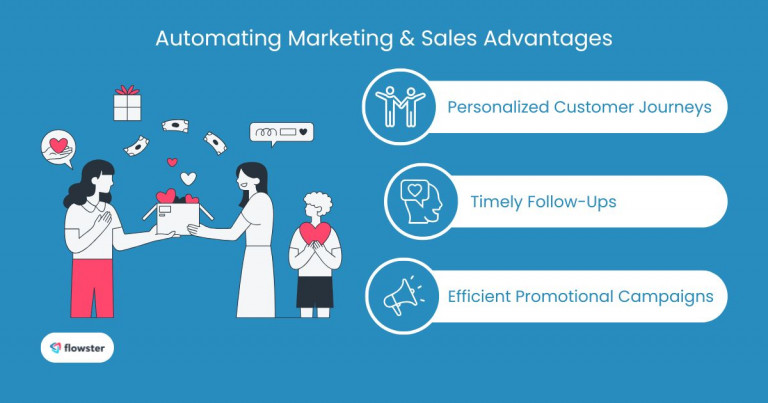
Case Study: How Flowster Improved eCommerce Process Management for Laura Goldenstein
This case study serves as a powerful example of how automation can directly benefit eCommerce businesses. Laura Goldenstein’s experience with Flowster highlights the practical benefits of streamlining key business processes through automation.
Background: Challenges Before Automation
Prior to implementing automation, Laura faced several challenges in managing her eCommerce operations manually. These challenges included:
- Inefficiencies in task management: Manually managing a multitude of tasks, from order processing to customer support, was time-consuming and prone to errors.
- Time-consuming workflows: Completing essential tasks manually slowed down overall operations, hindering efficiency and productivity.
- Difficulty in scaling the business: The manual approach limited Laura’s ability to scale her business as it grew, restricting her potential for customer acquisition and sales growth.
The Role of Flowster in Transforming Operations
To overcome these challenges, Laura implemented Flowster’s process automation tools. Flowster’s capabilities helped her automate various aspects of her business, leading to significant improvements. Some key areas impacted by automation included:
- Task automation: Flowster streamlined repetitive tasks like order processing and inventory management, freeing up Laura’s time to focus on higher-level strategies.
- Inventory management: Automated inventory controls helped Laura maintain accurate stock levels, reducing the risk of stockouts and overstocking.
- Order processing: Flowster automated order processing workflows, ensuring faster order fulfillment and improved customer satisfaction.
Key Results and Outcomes
Laura’s experience with Flowster resulted in several key improvements:
- Time saved: Automating tasks allowed Laura to reclaim significant time, which she could then dedicate to growing her business.
- Improved workflow efficiency: Flowster streamlined workflows, leading to increased efficiency and productivity across all operations.
- Ability to scale the business: Automation empowered Laura to scale her business more effectively, accommodating increased customer demand and sales growth.
In the case study video, Laura emphasizes the positive impact of Flowster: “Flowster has been a game-changer for my business. It’s freed up so much of my time, and now I can focus on more strategic things to grow my brand.”
Lessons Learned for Other eCommerce Businesses
Laura’s experience with Flowster offers valuable lessons for other eCommerce businesses. Here are some key takeaways:
- Automation can significantly improve efficiency and productivity. By automating repetitive tasks, businesses can reclaim valuable time and resources, allowing them to focus on more strategic initiatives.
- Streamlined workflows enhance customer satisfaction. Faster order processing, accurate inventory control, and timely communication all contribute to a better customer experience.
- Automation empowers businesses to scale effectively. Implementing automation solutions allows businesses to handle increased demand and sales growth without compromising efficiency or quality.
By following Laura’s lead and embracing automation, eCommerce businesses can unlock their full potential and achieve sustainable growth.
Capture Your Processes in Minutes!
Conclusion: Automate Your Way to eCommerce Success
In today’s competitive online marketplace, efficient and streamlined operations are crucial for eCommerce businesses to thrive. By implementing effective eCommerce process management strategies that leverage automation, businesses can unlock a multitude of benefits.
As we’ve seen through Laura’s experience, automating key processes like order processing, inventory management, and customer support can significantly improve efficiency, reduce errors, and free up valuable time. This allows businesses to focus on strategic growth initiatives, enhance customer satisfaction, and ultimately achieve greater success.
Ready to automate your eCommerce operations and take your business to the next level? Flowster offers a comprehensive suite of automation tools designed to streamline your workflows and boost your efficiency. Sign up for a free trial of Flowster and experience the power of automation firsthand.
Flowster's AI-Driven Automation
If you need more personalized support, Flowster’s “Done-for-You” services can help you design, implement, and optimize your eCommerce processes. Our experts can tailor solutions to your specific business needs and ensure that your operations run smoothly.
Don’t wait—automate your way to eCommerce success with Flowster!




